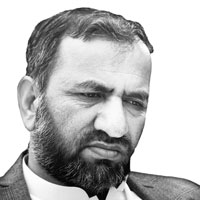“The BSA is going to be signed,” a senior Afghan diplomat tells The Daily Beast, referring to the stalled security agreement that would keep Western military forces in Afghanistan after 2014. The current standoff in negotiations between the U.S. and Afghan President Hamid Karzai is “a game, just like bargaining or brokering. The U.S. and Afghans both need BSA for their interests,” the diplomat says.
In exclusive interviews, The Daily Beast spoke with senior Afghan politicians, members of the Taliban, military officers and tribal leaders, and heard their feelings about Karzai’s refusal to sign the BSA, his increasing antagonism towards the U.S., and whether Western forces should stay in Afghanistan.
“The U.S. should stay forever in Afghanistan,” Haji Lal Agha, a white-bearded tribal leader from the north of Kabul, tells The Daily Beast.
Many Afghans share Agha’s views about the importance of U.S. forces in preventing the Taliban from taking power, including some who view a continued U.S. presence as the lesser of two evils. Agha has other opinions that are less common among Afghans. “We would not mind even if Israeli forces stay in Afghanistan and guard us from Taliban and Pakistan,” Agha says.
But Afghan parliamentarian Abdul Satar Khawasi says, “I do not want a single U.S. soldier in Afghanistan after 2014, I would be happy even if they leave right now.”
Khawasi, known for his hostility to the U.S., was recently found by The New York Times to have included fraudulent photos taken from a Taliban website as evidence in a government report on an air strike that caused civilian casualties in the province of Parwan.
At 75 years old, the tribal leader Agha has lived through decades of war and upheaval. It’s a legacy shared by all Afghans his age but he worries that others have not taken the same lessons that he has. “This is the problem with our Afghans,” Agha says. “We forget history very quickly; just think 12 years back and the whole nation was saved from the Taliban by the U.S.”
Agha believes that without the U.S. and NATO forces in Afghanistan, the Taliban will quickly regain power. The Taliban’s resurgence, Agah says, is not “because of U.S. mistakes. If the Taliban exists it is because of Karzai and his warlord’s regime.” Agah warns, “I am sure the day the U.S. leaves, the Taliban will get back in business.”
An Afghan Taliban commander who goes by the name of Abu Jihad Yar says that the presence of American forces fuels the insurgency and that many Taliban fighters would disarm if the U.S. left. “They [members of the Taliban] fight because of the Americans and NATO forces—big numbers of us do not want to fight an internal war,” Yar says. If the U.S. does keep military forces in Afghanistan, Yar believes that “due to their support of the Afghan Army we would not be able to capture any major city.”
Afghan Army colonel Ahmad Zai believes that the Afghan military can control the security situation on its own and that foreign forces are only inflaming tensions and destabilizing the country. “U.S. forces have already disengaged…they should go home,” Zai says. President Karzai’s accusations that the U.S. has engaged in needless killing of civilians and terrorized ordinary Afghans are true, according to Zai, who says that “Karzai’s speeches are the voice of our hearts.”
But another Afghan Army officer, a major who asked not to be named, takes the opposite view. The major believes that President Karzai has behaved irrationally and that the Afghan military would not be able to defend the country without the U.S. and NATO. The Afghan Army is big in numbers, the major says, “but we do not have air force to fight the Taliban.” Corruption and nepotism are rampant in the Afghan Army and “it would collapse without U.S. financial support,” the major says.
There is a division in the country between those in the capital who are more secure and insulated from the Taliban’s reach and those in the country’s south, where the Taliban is strongest, according to the major. The Afghan soldiers who have been stationed in Kandahar and Helmand “understand the pressure of the Taliban,” the major says, while “those sitting in Kabul are playing a war of words with the U.S.”
It is unclear to many American and Afghan observers why President Karzai has refused to conclude a security agreement with the U.S. given the tenuous security situation in Afghanistan, the billions of dollars in U.S. aid at stake, and Karzai’s own repeated desire to have one signed. A former senior advisor to Karzai says that his recent manner of dealing with the BSA has been “incomprehensible for Afghans.” But the former advisor believes that “President Karzai is worried about U.S. interference in the coming election. That’s why he wants to keep the U.S. under pressure, to prevent them from interfering in the election.”
The senior Afghan diplomat who told The Daily Beast that the BSA would definitely be signed, dismissing what appear to be significant obstacles as bargaining points that would be resolved, added that the Afghan government fears that if the “U.S. fully withdraws [Afghanistan’s] neighbors will again struggle for their influence” over the country.
Though the Afghans who spoke with The Daily Beast differed in their attitudes towards Karzai and the U.S., few envisioned a future where Afghanistan could be both stable and autonomous. The choice for many Afghans is between a sovereign Afghanistan, free from Western influence but vulnerable to the Taliban and neighboring countries, or a nation still reliant on foreign powers for its security and not yet fully independent.






